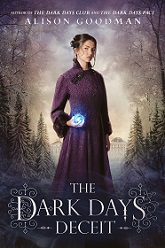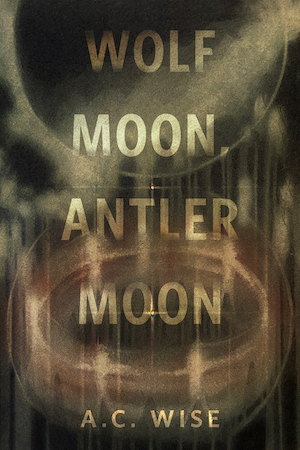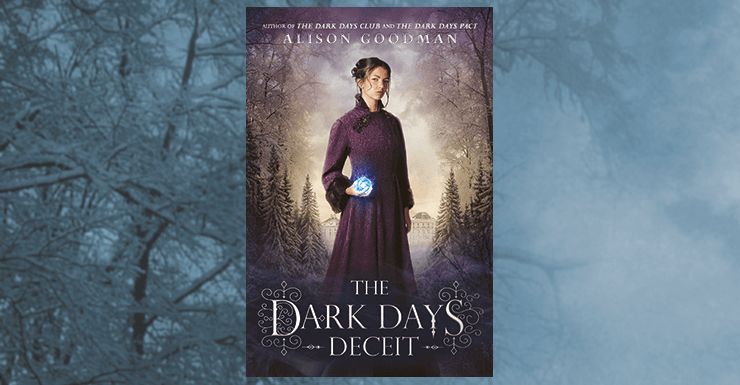The occult adventures of Lady Helen Wrexhall come to a thrilling conclusion in The Dark Days Deceit, the third and final book in Alison Goodman’s delightful Lady Helen series. It’s been an intense year. In the spring Helen learned she was a Reclaimer like her late mother, a being with the power to kill Deceivers, basically otherworldly demons. That summer she and Lord Carlston learned of a plot to destroy the world and were united as the Grand Reclaimer. Now it’s nearly Christmas and the end is nigh. By day Helen practices controlling her strange powers, and by night the Dark Days Club trolls the streets looking for the enemy.
All Helen and Carlston have to do is stop the Grand Deceiver. Easy peasy, lemon squeezy. The only problem is her increasingly uncontrollable and destructive powers. And her upcoming marriage to the Duke of Selburn. And learning how to run a massive estate. And keeping her nosy relatives out of her Reclaiming business. Oh, and protecting the entire city of Bath from a pair of bloodthirsty Deceivers. Not to mention her simmering attraction to Lord Carlston. But other than that…
Goodman’s attention to historical detail is mind-boggling. We spend as much time watching Helen getting dressed or having her hair done by Darby and Sprat as we do with her battling great evil. The descriptions of Chenwith Hall as Helen navigates its lavish rooms are so vivid it’s like we’re right there with her. Goodman offers just as much detail to society, both high and low, as she does to architecture and fashion. None of it feels like an infodump. It’s sprinkled throughout the text and dialogue in an immersive way. Half the fun of the Lady Helen series is exploring Regency London and Bath, and Goodman doesn’t skimp on the minutiae.
With Carlston and Helen forced by social conventions to kill their growing attraction and Helen and Selburn disallowed by the rules of propriety from getting to know each other intimately, there isn’t much in the way of sexy romance in the third volume. Nevertheless, Helen and Selburn’s struggles to figure each other out are charming (except when he infringes on Helen’s independence and duties to the crown). Helen must decide what she wants: to give into the heat of desire with Lord Carlston or hope she might eventually feel the same for the Duke of Selburn. The former means ruining her reputation and that of her family for a fling that cannot last, and the latter means sacrificing her abilities as a Reclaimer to become a socialite. What is a lady to do?
Not everything in The Dark Days Deceit works as well as it could have. The third novel isn’t as harsh in its examinations of social norms as the first two. There are several occasions when Helen encounters misogyny and sexism and rather than calling it out (even in coded Regency terms) she allows it to pass without much remark other than a brief thought tinged with mild irritation. In some cases, Goodman actually reinforces traditional gender roles. As much as Helen worries about the complications that will arise as she tries to be both a Reclaimer and a mother/wife/duchess, the root of her stress has more to do with how she will hold up social norms than how she’ll maintain her personal agency.
Furthermore, for whatever reason, Deceivers—which are not human, although they possess human bodies—operate on the Western European gender binary. Why? Who knows. Because of this, Grand Deceivers and Grand Reclaimers must always be a male-female pair. And no one comments on how inexplicable and weird that is. It creates friction with the internal logic of the series in which the overwhelming majority of Reclaimers are men and is a wholly unnecessary and potentially harmful piece of information for contemporary readers.
My frustrations were echoed in the shallowness of the critiques on racism, colonialism, and homophobia. On these topics the novel is oblique at best, disregarding at worst. None get more than an offhand observation. Absent is the depth and nuance Goodman infused into the first two novels. All the good work Goodman put in in The Dark Days Club and The Dark Days Pact was largely ignored in The Dark Days Deceit, to its detriment.
Buy the Book


The Dark Days Deceit
While Helen suddenly deigns not to look too deeply at why she is so willing to sign up for a lifetime of rigid gender roles when she clearly enjoys breaking them, she’s still a firecracker of a protagonist. She fears her new powers, and rightfully so, but never lets that get in the way of using them when the time comes. She’s ready to fight and die for what she believes is right, although she’d rather not have to. To paraphrase Jane Austen, there is a stubbornness about Helen that never can bear to be frightened at the will of others. Her courage always rises at every attempt to intimidate her.
Part Regency-era romance and part supernatural murder mystery, the Lady Helen series is full of wry observations, heart-pounding action, and swoon-worthy relationships. The Dark Days Deceit doesn’t quite meet the high water mark set by the rest of the series, yet I still couldn’t put it down. History nerds, romance buffs, and fantasy geeks will all find plenty to love here. With plot twist upon plot twist upon plot twist, Goodman never settles for the expected or easy. Lady Helen fans should come out the end of The Dark Days Deceit fairly well satisfied.
The Dark Days Deceit is available from Viking Books for Young Readers.
Alex Brown is a YA librarian by day, local historian by night, pop culture critic/reviewer by passion, and an ace/aro Black woman all the time. Keep up with her every move on Twitter, check out her endless barrage of cute rat pics on Instagram, or follow along with her reading adventures on her blog.










